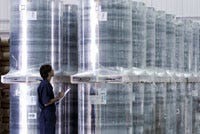In an interview with MPW early this week from his office in Oman, Nicholas Barakat, managing director of polyethylene terephthalate (PET) sheet supplier Octal Petrochemicals, said his company will in the next days close on the equity and mezzanine financing it needs to begin its second stage of expansion, which will end with start-up of a new 500,000-tonne/year PET plant in 2011.
March 18, 2009
In an interview with MPW early this week from his office in Oman, Nicholas Barakat, managing director of polyethylene terephthalate (PET) sheet supplier Octal Petrochemicals, said his company will in the next days close on the equity and mezzanine financing it needs to begin its second stage of expansion, which will end with start-up of a new 500,000-tonne/year PET plant in 2011.
Octal was only founded in 2006 (read the initial report here) and only just completed the addition of another 150,000-tonne/yr PET reactor, which gives it 300,000-tonnes/yr PERT capacity, in addition to its 180,000-tonne/year capacity for sheet production.
|
Note the terminology: sheet production, not sheet extrusion. Octal has patented a technology it calls DPET (Direct-to-PET) in which, put simply, melt from its PET reactors is fed straight into a sheet die. “Everything that degrades the resin is gone,” he said. The melt never runs through an extruder screw, so there is no heat history added to the material, emphasized Barakat. Taking extrusion out of the processing equation makes for sheet with improved optical and mechanical properties, he said, as well as trims about 65% off the amount of energy typically required for sheet extrusion. “It’s truly like a mirror,” he said of the sheet, which exits the die, is calendared and then rolled for shipment to customers in Europe or North America. He claims thermoformers can lower their processing temperatures by about 5°C when processing the sheet due to its low crystallinity.
Octal has added a corona treater so it can prepare sheet for customers who need to print on it, and also added a slitter/rewinder for processors running form/fill/seal lines. Barakat said the firm could also offer multi-layer (A-B-A) sheet. He claimed that the firm’s sheet lines now can produce sheet within +/- 0.2% of spec, meaning its customers get more sheet/tonne than from sheet suppliers whose lines are not as accurate; he said the industry average is above 5%.
The company also has acquired two large Vacurema PET reprocessing systems from Austrian machine manufacturer Erema, and is working with these to help its thermoforming customers learn more about reprocessing of their trim scrap.
Until now Barakat said he is not able to name any customers, though he expects to be able to make at least one public shortly. He claims shipping time from Octal’s headquarters in the southeast port city of Salalah to customers in Europe is about 12-14 days, with another seven-10 days added for customers in North America. He argues that this puts shipments within a window more suitable for Western purchasing managers than if they were to order sheet from Asia, which would require a longer timeframe and possibly purchasing agreements made 60 days out.
Although its PET until now is almost exclusively used for its own captive sheet production, Barakat said the new line, set to start up in 2011, would produce bottle-grade PET and be marketed to blowmolders. —[email protected]
About the Author(s)
You May Also Like



